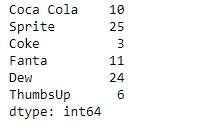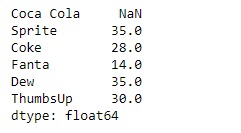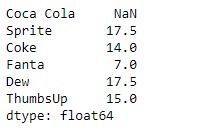Pandas 系列是带有轴标签的一维ndarray。标签不必是唯一的,但必须是可哈希的类型。该对象同时支持基于整数和基于标签的索引,并提供了许多用于执行涉及索引的操作的方法。
Pandas Series.rolling()函数是非常有用的函数。它提供给定Series对象中基础数据的滚动窗口计算。
用法: Series.rolling(window, min_periods=None, center=False, win_type=None, on=None, axis=0, closed=None)
参数:
window:移动窗口的大小
min_periods:具有值的窗口中最小观察数
center:将标签设置在窗口的中央。
win_type:提供窗口类型。
on:str,可选
axis:int或str,默认为0
closed:在“右侧”,“左侧”,“两个”或“两个都不”端点上关闭间隔。
返回:用于特定操作的窗口或滚动sub-classed
范例1:采用Series.rolling()函数查找给定Series对象的基础数据的滚动窗口总和。滚动窗口的大小应为2,每个元素的权重应相同。
# importing pandas as pd
import pandas as pd
# Creating the Series
sr = pd.Series([10, 25, 3, 11, 24, 6])
# Create the Index
index_ = ['Coca Cola', 'Sprite', 'Coke', 'Fanta', 'Dew', 'ThumbsUp']
# set the index
sr.index = index_
# Print the series
print(sr)输出:

现在我们将使用Series.rolling()函数查找窗口大小为2的基础数据之和
# Find sum over a window size of 2
result = sr.rolling(2).sum()
# Print the returned Series object
print(result)输出:

正如我们在输出中看到的,Series.rolling()函数已成功返回一个序列对象,该对象在窗口大小为2的范围内找到了基础数据的总和。请注意,第一个值是缺少的值,因为之前没有元素,因此无法执行总和。
范例2:采用Series.rolling()函数查找给定Series对象的基础数据的滚动窗口总和。滚动窗口的大小应为2,滚动窗口类型应为“ triang”。
# importing pandas as pd
import pandas as pd
# Creating the Series
sr = pd.Series([10, 25, 3, 11, 24, 6])
# Create the Index
index_ = ['Coca Cola', 'Sprite', 'Coke', 'Fanta', 'Dew', 'ThumbsUp']
# set the index
sr.index = index_
# Print the series
print(sr)输出:

现在我们将使用Series.rolling()函数查找窗口大小为2的基础数据之和
# Find sum over a window size of 2
# We have also provided the window type
result = sr.rolling(2, win_type ='triang').sum()
# Print the returned Series object
print(result)输出:

正如我们在输出中看到的,Series.rolling()函数已成功返回一个序列对象,该对象在窗口大小为2的范围内找到了基础数据的总和。请注意,第一个值是缺少的值,因为之前没有元素,因此无法执行总和。
相关用法
- Python pandas.map()用法及代码示例
- Python Pandas Timestamp.now用法及代码示例
- Python Pandas Timestamp.second用法及代码示例
- Python Pandas DataFrame.abs()用法及代码示例
- Python Pandas Series.lt()用法及代码示例
- Python Pandas dataframe.all()用法及代码示例
- Python Pandas DataFrame.ix[ ]用法及代码示例
- Python Pandas Series.pop()用法及代码示例
- Python Pandas TimedeltaIndex.max用法及代码示例
- Python Pandas Timestamp.dst用法及代码示例
- Python Pandas Timestamp.tz用法及代码示例
- Python Pandas Series.mean()用法及代码示例
- Python Pandas TimedeltaIndex.min用法及代码示例
- Python Pandas Series.ptp()用法及代码示例
- Python Pandas dataframe.cov()用法及代码示例
注:本文由纯净天空筛选整理自Shubham__Ranjan大神的英文原创作品 Python | Pandas Series.rolling()。非经特殊声明,原始代码版权归原作者所有,本译文未经允许或授权,请勿转载或复制。
